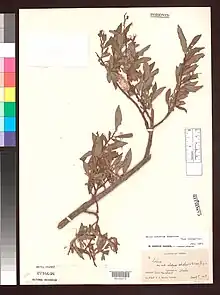| Salix characta | |
|---|---|
 | |
| Scientific classification | |
| Kingdom: | Plantae |
| Clade: | Tracheophytes |
| Clade: | Angiosperms |
| Clade: | Eudicots |
| Clade: | Rosids |
| Order: | Malpighiales |
| Family: | Salicaceae |
| Genus: | Salix |
| Species: | S. characta |
| Binomial name | |
| Salix characta | |
Salix characta is a shrub from the genus of willow (Salix) with initially downy hairy branches. The leaf blades have lengths of 3.5 to sometimes 7 centimeters. The natural range of the species is in China.
Description
Salix characta is a shrub with gray-yellowish-brown or red-brown, initially downy-haired branches. The buds are red-brown and egg-shaped. The leaves have a 1 to 3, rarely 4 millimeter long, shaggy stalk. The leaf blade is oblong-lanceolate, rarely elongated, 3.5 to rarely 7 centimeters long and 0.6 to 1 rarely 1.3 centimeters wide, pointed or rarely pointed, with a pointed or rarely almost blunt base and a serrate and rolled-up leaf margin. The top is green and fine downy, gray-green, the bottom and along the midrib shaggy hair.[1]
The inflorescences are 1.5 to 2.5 centimeters long, dense-flowered, sitting or short-stalked catkins . The inflorescence axis is hairy down. The bracts are brown, elliptical, oblong or ovate, with a pointed or blunt tip and long downy hairs. Male flowers have an adaxial, linear or elongated nectar gland . The two stamens are bare. The female catkins are up to 4 inches long. Female flowers have an egg-shaped narrow at the base daunig hairy ovary on a fluff hairy stem. The stylusis lobed, about half the length of the ovary or shorter. The scar is short, entire or bilobed. The fruit forms 4 millimeter long, stalked capsules that are finely haired at the base. Salix characta flowers in May, the fruits ripen in June and July.[1]
Range
The natural range is in the Chinese provinces of Gansu, Hebei, in Inner Mongolia, in Qinghai, Shaanxi, and Shanxi on mountain slopes at altitudes of 2200 to 3200 meters.[1]
Taxonomy
Salix characta is a species from the genus of willows (Salix) in the willow family (Salicaceae).[1] There, it is the section vimen assigned.[2] It was described for the first time scientifically in 1916 by Camillo Karl Schneider.[1] The genus name Salix is Latin and has been from the Romans used for various willow species.[3]
Literature
- Wu Zheng-yi, Peter H. Raven (Ed.): Flora of China . Volume 4: Cycadaceae through Fagaceae . Science Press / Missouri Botanical Garden Press, Beijing / St. Louis 1999, ISBN 0-915279-70-3, pp. 253, 254 (English).
- Helmut Genaust: Etymological dictionary of botanical plant names. 3rd, completely revised and expanded edition. Nikol, Hamburg 2005, ISBN 3-937872-16-7, p. 552 (reprint from 1996).
References
- 1 2 3 4 5 Cheng-fu Fang, Shi-dong Zhao, Alexei K. Skvortsov: Salix characta, in der Flora of China, Band 4, S. 254
- ↑ Cheng-fu Fang, Shi-dong Zhao, Alexei K. Skvortsov: Salix Sect. Vimen, in der Flora of China, Band 4, S. 253
- ↑ Genaust: Etymologisches Wörterbuch der botanischen Pflanzennamen, S. 552